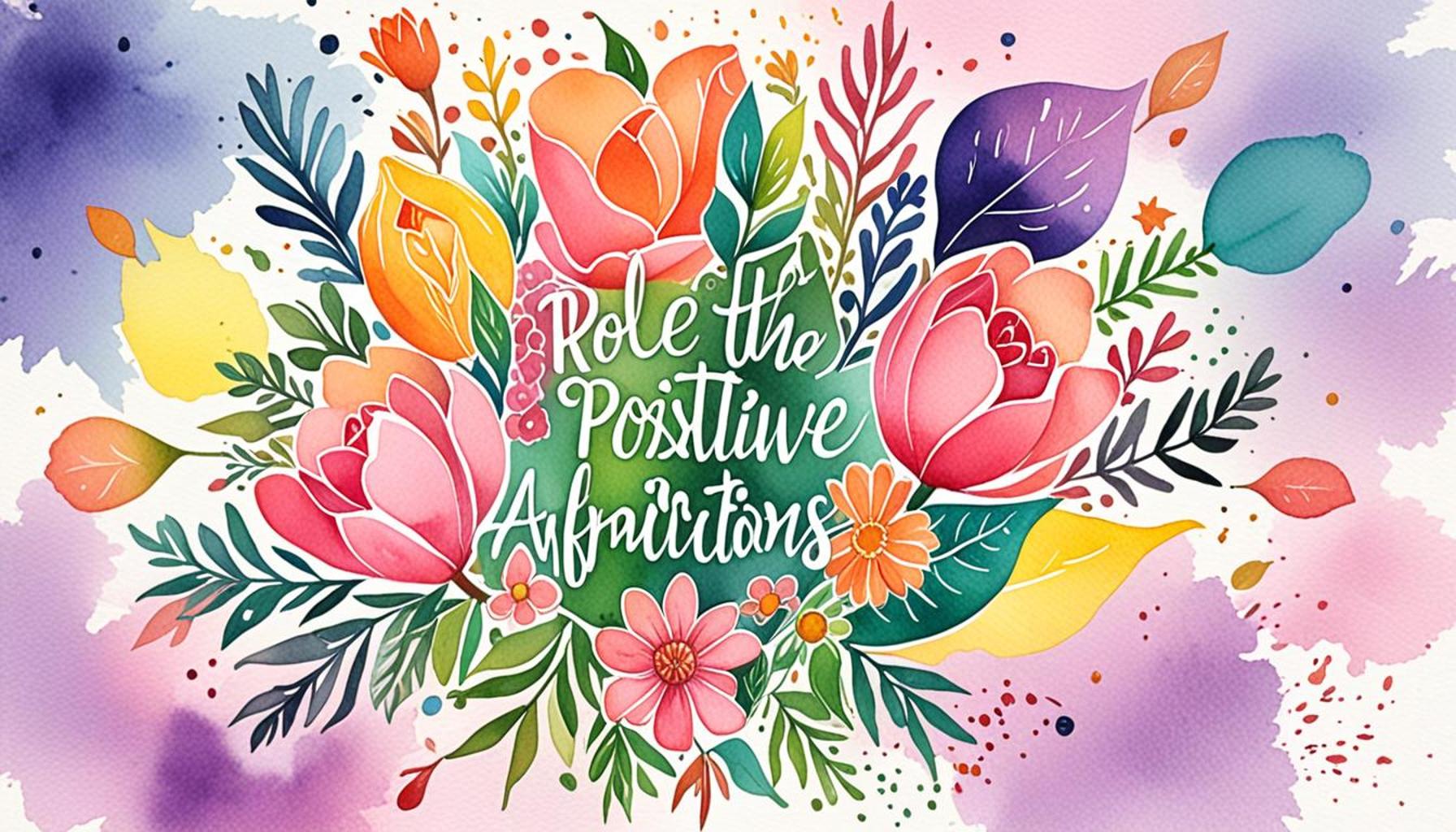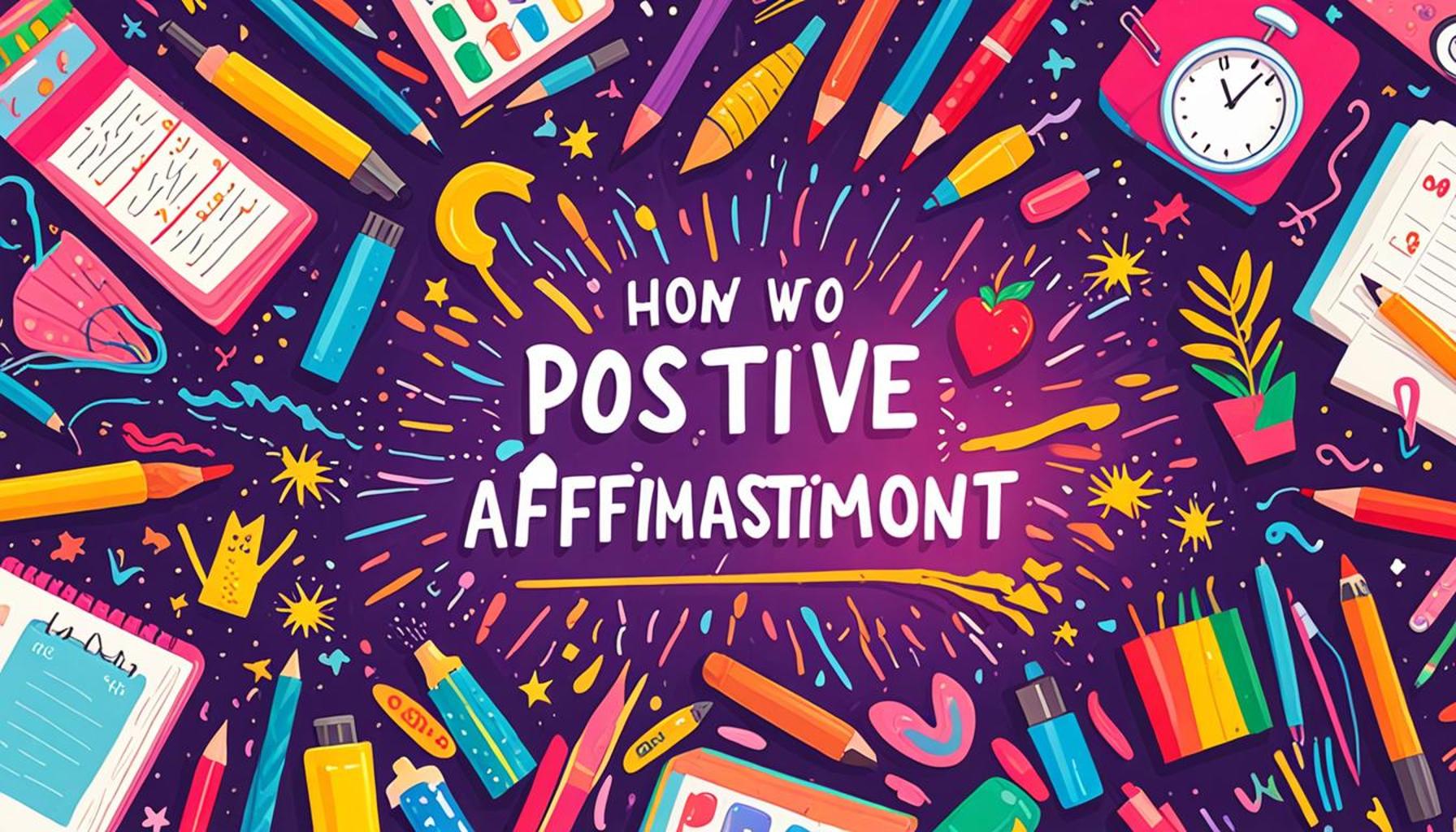The Role of Positive Affirmations in Promoting Mental and Emotional Well-Being

Diving Deeper into Positive Affirmations
In a world bustling with challenges, the concept of positive affirmations is gaining traction. These simple yet powerful statements can significantly influence our mental and emotional well-being. But what exactly are positive affirmations?
- Repetitive affirmations: These are phrases that you can recite regularly to help reshape your mindset. For instance, saying “I am capable of achieving my goals” each morning can set a positive tone for the day.
- Personal empowerment: Positive affirmations serve as tools that encourage self-love and confidence. A statement like “I am worthy of love and success” can challenge negative self-talk and promote a healthier self-image.
- Mental shift: By using affirmations, individuals can combat negative thoughts and self-doubt. For example, reciting “I believe in my abilities” can create a mental shift that helps overcome fears associated with performance and achievement.
The Impact on Well-Being
Numerous studies highlight the benefits of incorporating positive affirmations into daily routines. They not only foster a healthier self-image but also promote resilience against stress and anxiety. Here are some key benefits:
- Reduction in anxiety: Research indicates that using affirmations can help you feel more grounded and centered. In Nigeria, where the societal and financial pressures can often feel overwhelming, affirmations can play a vital role in maintaining mental balance.
- Boosts self-esteem: Regularly practicing positive affirmations can encourage a positive self-identity among individuals. For example, local youth can benefit immensely by reminding themselves that “I have the power to make a difference in my community.”
- Enhances problem-solving: By promoting a more optimistic outlook on life’s challenges, affirmations can help individuals navigate complex situations. In a rapidly changing environment, knowing “I can cope with any challenge” can prepare individuals for unexpected difficulties.
In Nigeria, where societal pressures can often be overwhelming, positive affirmations can serve as vital tools for many individuals. The socioeconomic dynamics in urban areas, such as Lagos and Abuja, often contribute to heightened stress levels. Affirmations can offer individuals a means to cultivate inner strength and resilience amidst these everyday struggles. When communities rally around the idea of shared affirmations, such as “Together, we can achieve greatness,” it can create a ripple effect toward improved community mental health.
Moreover, schools and organizations are beginning to recognize the power of positive affirmations. By integrating these practices into curriculums or workplace cultures, they can foster a more supportive and optimistic environment, leading to improved overall well-being. As more Nigerians embrace positive affirmations, the potential to transform both individual lives and broader society becomes increasingly tangible.
ADDITIONAL INSIGHTS: Expand your understanding here

The Science Behind Positive Affirmations
The effectiveness of positive affirmations extends beyond mere anecdotes; a substantial body of psychological research supports their role in enhancing mental and emotional well-being. At the core of this phenomenon lies the brain’s neuroplasticity, which refers to its remarkable ability to reorganize itself by forming new connections and pathways. Each time individuals recite affirmations, they transmit powerful messages to their subconscious mind, cultivating a positive self-image and resilience that can significantly impact their ability to navigate the multitude of daily challenges. This scientific foundation is particularly relevant within the context of Nigeria, where societal pressures and economic challenges often contribute to heightened mental health struggles.
Cognitive Benefits of Affirmations
The cognitive benefits of positive affirmations can profoundly influence mental health, offering a multitude of advantages that resonate with individuals facing various life circumstances:
- Increased Motivation: Positive affirmations play a vital role in reinforcing a constructive self-view, which promotes motivation. For example, an individual might declare, “I am capable of achieving my dreams,” which can inspire them to pursue their ambitions with renewed vigor and determination.
- Stress Reduction: The consistent practice of positive affirmations can act as a protective buffer against chronic stress. For people living in bustling cities like Lagos, where the pace of life can be relentless, recitations such as “I am calm and in control” serve as mental anchors, aiding in the management of daily anxieties.
- Enhanced Focus: Affirmations are also instrumental in improving concentration levels. Repeating phrases like “I am focused and clear-minded” enables individuals to more effectively navigate tasks requiring sharp mental clarity, even amidst the inevitable distractions of modern life.
In Nigeria’s dynamic socio-economic landscape, these cognitive benefits take on added significance. Consider students facing the pressures of preparing for critical examinations; by utilizing affirmations to enhance their self-confidence and alleviate performance-related anxiety, they can articulate statements such as “I am prepared and capable.” This practice not only fosters a more positive mindset but can also lead to improved academic performance.
Furthermore, positive affirmations can foster a greater sense of community and collective resilience. Phrases like “We are stronger together” resonate deeply within community settings, especially in close-knit neighborhoods where shared challenges are common. Such affirmations can promote supportive environments, elevating individual spirits while encouraging a collaborative mentality focused on growth and resilience.
As understanding and acceptance of mental health issues evolve, educational institutions and organizations throughout Nigeria are increasingly incorporating positive affirmations into their daily practices. By encouraging young people to embrace these affirmations, they are not only championing individual well-being but are also enriching the broader societal fabric. This progressive approach may wield transformative power, cultivating a future generation that prioritizes mental health and emotional resilience.
In summary, the science of positive affirmations reveals a wealth of cognitive benefits that can enhance individual mental health while simultaneously strengthening communal bonds. As more people become aware of these advantages, a movement toward integrating affirmations into everyday life is likely to flourish, promising profound impacts on the collective psyche of Nigerian society.
| Advantage | Description |
|---|---|
| Enhanced Self-Esteem | Positive affirmations can significantly boost self-esteem by helping individuals replace negative thoughts with affirming, empowering statements. |
| Reduced Anxiety | Practicing positive affirmations can lead to a decrease in anxiety levels, making it easier to manage stress and maintain emotional balance. |
The practice of using positive affirmations has become increasingly embraced as an accessible tool in promoting mental and emotional well-being. They work by reshaping one’s thought process and countering the negative narratives that often take root in our minds. Enhanced self-esteem is a remarkable outcome of consistent affirmation use; when individuals vocalize their worth and potential, they begin to believe it, thus reinforcing their value in various aspects of life.Furthermore, reducing anxiety through positive affirmations creates a protective barrier against the overwhelming pressures of daily life. These powerful phrases serve as a reminder of resilience and strength, enabling individuals to face challenges while maintaining a sense of calm. The importance of integrating such practices into daily routines cannot be overstated, as they contribute to a more balanced, optimistic outlook toward oneself and the world.Research shows that those who engage in affirmation practice experience transformative changes, not only in how they view themselves but also in their emotional responses to external events. By dedicating a few moments each day to affirm positive truths, individuals can pave the way towards improved mental health and emotional stability.
RECOMMENDED: Check out this similar article
Cultural Integration of Affirmations in Daily Life
The integration of positive affirmations within the cultural fabric of Nigeria can serve as a crucial instrument for enhancing mental and emotional well-being. Different communities nationwide have their methods of inspiring and uplifting each other, and positive affirmations can be seamlessly woven into these practices. Traditional sayings, proverbs, and even songs often hold affirming messages that encourage resilience and positivity. Such cultural elements can act as a springboard for individuals to craft personalized affirmations that resonate deeply with their lived experiences.
Community and Social Influence
In Nigeria’s multifaceted society, the power of community cannot be overstated. Individual well-being is often tied to social dynamics. Positive affirmations can be utilized to foster communal strength. For instance, in gatherings during cultural festivals or community meetings, collective affirmations such as “We rise together” can reinforce a shared commitment to support one another through adversities. This communal approach helps build a safety net of emotional support, crucial in times of personal or societal crises.
Moreover, in workplaces, leaders can promote a culture of positivity by encouraging teams to engage in daily affirmations. Phrases like “We can achieve our goals” can enhance collaboration and unity, reducing feelings of isolation among employees. By regularly practicing these affirmations, organizations can cultivate an environment where mental health awareness is prioritized, leading to lower turnover rates and higher overall morale.
Affirmations in Education and Youth Development
The potential of positive affirmations is particularly impactful in educational settings, where young minds are shaped and nurtured. Schools across Nigeria are beginning to incorporate affirmation practices into their curricula to help students cultivate self-confidence and resilience. Encouraging students to proclaim affirmations like “I am intelligent and capable” before exams not only alleviates anxiety but also fosters a positive learning environment. Evidence suggests that students who engage with positive affirmations show improved academic performance and better emotional regulation, as they feel empowered to tackle challenges head-on.
Additionally, youth programs that focus on peer mentorship can utilize affirmations as tools for personal growth. When mentors guide younger individuals to embrace statements like “I am worthy of success,” they instill a sense of agency that can be crucial during adolescence—a time often riddled with self-doubt and societal pressure. Such initiatives promote mental health resilience among the youth, preparing them to face future challenges with confidence and assurance.
The Ripple Effects of Affirmations on Mental Health Awareness
In light of the ongoing conversations surrounding mental health in Nigeria, the widespread adoption of positive affirmations can influence perceptions and open dialogues regarding emotional well-being. As more individuals share their affirmation practices, normalization occurs, and stigma around mental health challenges diminishes. This cultural shift can lead to a deeper understanding of psychological issues and promote empathy among community members, making it easier for individuals to seek help when needed.
Studies indicate that a supportive social environment can mitigate the adverse effects of mental health issues, and positive affirmations can play a pivotal role in shaping such an environment. By cultivating a culture of affirmation, Nigerian society can fortify its collective psychological resilience, empowering individuals to reclaim their mental health journeys.
CHECK OUT: Click here to explore more
Conclusion: Harnessing the Power of Positive Affirmations
In the intricate tapestry of Nigerian society, the role of positive affirmations emerges as a transformative force in promoting mental and emotional well-being. By integrating affirmations into various aspects of life—from community gatherings to educational settings—we create an environment where individuals are empowered to embrace their inner strengths and overcome challenges. The amalgamation of cultural values, communal support, and the potential for personal growth through affirmations catalyzes a shift in mindset that is crucial for fostering resilience and optimism.
As we continue to delve into the significance of affirmations, it becomes evident that their impact extends beyond individual benefits; they ripple through communities, forging connections and reducing stigma around mental health. When collective affirmations resonate within a group, they build a sense of belonging and shared purpose. This interconnectedness is vital in a nation grappling with various societal pressures and economic challenges.
Moreover, the incorporation of affirmations in educational contexts not only equips the youth with the tools to combat self-doubt but also lays the groundwork for a more resilient future generation. As students adopt a mindset rooted in positivity, they are better prepared to navigate life’s complexities. In turn, this practice can contribute to a broader cultural shift that prioritizes mental health awareness, ultimately empowering individuals to seek help and support when needed.
In conclusion, the ongoing exploration of positive affirmations as a means to cultivate mental and emotional well-being in Nigeria invites us to consider their transformative potential. The call to action lies in embracing these practices within our daily lives and communities, ensuring that we are not just survivors of our circumstances but active architects of our mental health journeys. By fostering a culture of affirmation, we take meaningful steps toward a mentally healthier society.


